Sarah Ash's Blog, page 9
June 1, 2017
Jan Edwards – the Blog Tour Starts on June 2nd!
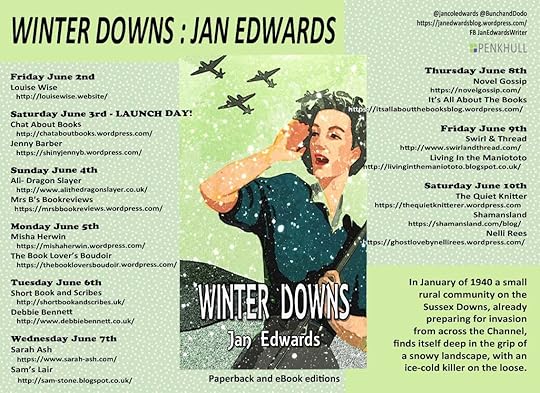
I’m really looking forward to hosting a new Guest Post from Jan Edwards on June 7th about switching genres from Horror to Crime as part of the Blog Tour for her new novel Winter Downs! (You can read Jan’s last Guest Post for the Guest Blog here.)
Please Feel Free to Share:







May 22, 2017
Juliet E. McKenna on the Guest Blog
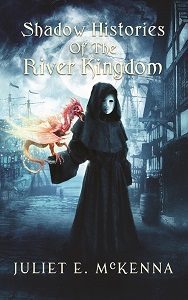
Did you miss Juliet E. McKenna‘s recent post on the Guest Blog? Catch it here! It makes some deeply relevant points about fiction publishing today and the dilemma of the mid-list author. There’s also excellent recommendations for SF&F fans looking for something different to read.
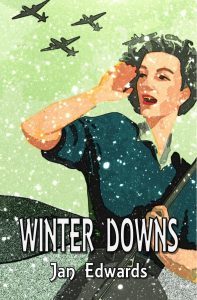
And coming up next on the Guest Blog on June 5th, Jan Edwards, talking about her new novel Winter Downs!
Please Feel Free to Share:







May 15, 2017
The Bugbear of the ‘Breakout Book’ for Readers and Writers alike – Juliet E. McKenna
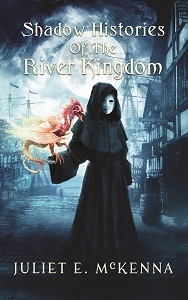
If you’re an author, at whatever stage in your career, you’ll be hearing this term more and more. Agents and editors alike tell us time and again at the moment that all they want to see is ‘a breakout book’. Now, the industry has always sought these books, and such bestsellers have traditionally kept publishing and booksellers afloat. Breakout books are assuredly a good thing for all concerned in the trade, as well as offering readers the fun of an enthusiasm they can share with lots of people. However, over the past decade this eagerness to find mass-market successes has become skewed. In particular, agents and editors alike are looking for instant successes among debut novelists. This isn’t helpful for either writers or book-lovers.
The industry has lost so much institutional knowledge that few people seem to remember that breakout books used to come from the midlist, where authors honed their skills and built a readership who would spread those still-vital word of mouth recommendations which sustain a writer’s career. Take a look at the best-selling novelists in any genre, from Terry Pratchett through George RR Martin to Robin Hobb in fantasy, through to the likes of Val McDermid and Ian Rankin in crime fiction. You’ll see their breakout books came a fair while after they first started writing and being published. Great writers are made, not born.
Take a look at recent break-out apparently-debut novels and you’ll almost always discover those authors have a background that’s taught them solid skills in communicating through the written word, frequently in journalism, technical, or non-fiction writing. Paula Hawkins, author of The Girl on the Train is a case in point. She wrote four novels earlier under a different name as well as working as a business journalist. Great writers are made, not born.
Writers also need time and space to write. Paula Hawkins’ second novel has not won good reviews. I have no specific knowledge of her circumstances while writing this particular book but I cannot help remembering an newspaper article some years ago, where a ‘latest hot new writer’ laid out the trajectory of her first novel’s success and much-hyped big advance, through to the critical and commercial failure of her second novel. Why couldn’t she make the grade a second time? Because she was trying to write that vital second book mostly in hotel rooms amid all the pressures of promoting the first on a UK book tour, a US book tour, an Australian book tour with all the media appearances and interviews that all entailed. She would have been far better served by being able to write two, three or four novels without ‘breakout book’ pressures, and so would the readers who enjoyed her work and will never see more of it.
Take another look at recent breakout books and other things become apparent. Mass-market agents and publishers focus on finding breakouts that closely resemble recent successes. That makes commercial sense for them, and certainly doesn’t imply that these books won’t be well worth reading – if you like the sorts of stories that currently dominate best-seller lists. If not? Those readers who used to sustain midlist authors writing for a much broader range of tastes can be left without very much to read these days. Go and look at the paperback displays in WHSmiths or your local Sainsbury’s and you’ll see what I mean.
Go to Waterstones or your local independent bookshop, most especially when they’re promoting a recent literary prize’s shortlist, and you’ll see something very different. We’re still seeing unexpected break-out books and these days, they’re frequently coming from small and specialist presses. His Bloody Project by Graeme Macrae Burnet is an example of this, shortlisted for the Booker Prize 2016 and published by the small Scottish imprint Contraband. In SF&F, the Arthur C Clarke Award for 2012 went to Jane Rogers for The Testament of Jessie Lamb from Sandstone Press.
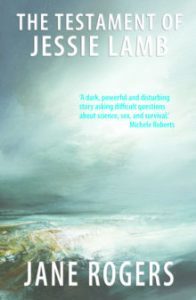
We can see smaller presses and diverse voices well-represented in this year’s Arthur C Clarke Award shortlist. The full list comprises A Closed and Common Orbit by Becky Chambers (Hodder & Stoughton), Ninefox Gambit by Yoon Ha Lee (Solaris), After Atlas by Emma Newman (Roc), Occupy Me by Tricia Sullivan (Gollancz), Central Station by Lavie Tidhar (PS Publishing) and The Underground Railroad by Colson Whitehead (Fleet). As in previous years the ACCA offers a great selection of reading which would never be found by only focusing on breakout books from debut authors. The same is true of other prize shortlists across SF&F and well beyond.
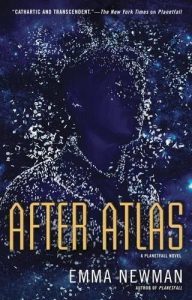
So this is good news for readers. If mass-market promotions offer you personally shelves full of nothing to read, you can and should go looking among the smaller and specialist presses. Similarly, aspiring writers may well find a home there for a well-written book that doesn’t fit a current mass-market template. Authors of whatever experience stand a good chance of finding passionate editors who can nurture a career without the commercial pressures that even the most dedicated editors in the big imprints must legitimately consider. We are particularly well served in SF&Fantasy by independent presses and by the smaller imprints within larger publishers which are run by those devoted to the genre*.
So we need to support those independents and specialist imprints. We need to make sure to check out their websites and blogs, and the fan sites which review them, because we won’t see these books piled high in shops, not even in Waterstones, until they reach a certain visibility threshold. If we prefer a paperback to an ebook, we need to accept that the costs of print on demand will mean small presses must charge a higher cover price than supermarket-discounted titles. We need to be aware that the convenience for us of ordering through Amazon may well do these publishers no good at all, and go to them direct even if that takes a bit longer. We need to continue to support these publishers after their hard work is rewarded by a break-out success which sees that author move to a conglomerate with deeper pockets and greater commercial reach.
If we don’t, we will lose them. That’s cold, hard, commercial reality. If that happens, then you really will be left without much to read if you’re not interested in The Girl Who Missed Her Train and Got Murdered or Maybe Not, no matter how well written that particular story might be.
*I’m not attempting to list them all – that would make for a very long article and even so, as soon as I hit send, I know I’d remember a handful more I should mention. Feel free to flag up your own particular favourites in comments.

Juliet E McKenna is a British fantasy author living in the Cotswolds, UK. Loving history, myth and other worlds since she first learned to read, she has written fifteen epic fantasy novels, from The Thief’s Gamble which began The Tales of Einarinn in 1999, to Defiant Peaks concluding The Hadrumal Crisis trilogy. Currently exploring new opportunities in digital publishing, she’s re-issued her early backlist as ebooks in association with Wizard’s Tower Press. Most recently, Shadow Histories of the River Kingdom offers readers a wholly new and different fantasy world to explore. In between novels, she writes diverse shorter fiction, ranging from stories for themed anthologies such as Alien Artifacts and Fight Like A Girl to forays into dark fantasy and steampunk including her tales of Challoner, Murray and Balfour: Monster Hunters at Law. She also reviews for web and print magazines and promotes SF&Fantasy by blogging on book trade issues, attending conventions and teaching creative writing.
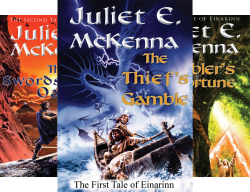
Follow her on Twitter @JulietEMcKenna
For some free stories as well as background on all her novels and her ongoing blog, visit julietemckenna.com
Please Feel Free to Share:







May 8, 2017
Don’t Miss Freda Warrington on the Guest Blog!
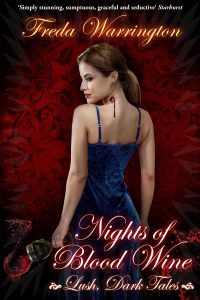
You can still read Freda Warrington’s thoughts on Escape and Escapism on the Guest Blog: relevant and thought-provoking reflections on reading and writing genre fiction.
Coming up next on the Guest Blog? You won’t want to miss Juliet E. McKenna, the next guest author, on May 15th!
Please Feel Free to Share:







May 1, 2017
Escape and Escapism by Freda Warrington
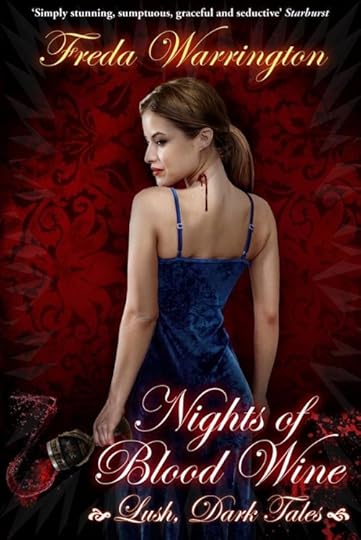
Escape and Escapism
While editing NIGHTS OF BLOOD WINE, my new (and first) short story collection, it struck me how many of the characters are trying to escape from something. I know escape is a common theme in fiction, but because my stories – although very varied – come from a common source (my brain), clearly something was going on in my unconscious. Difficult situations in our lives can make us feel trapped and longing for a way out. Let’s say, for example, the care of an elderly relative, or any kind of obligation that simply cannot be shirked. And sometimes a writer’s only way out is to work through the situation in their imagination, over and again, in different scenarios.
So that set me thinking about the theme of escape, and the continuing snobbery against fantastical literature as – imagine the condescending, sneering, nasal tone – ‘escapism’.
One of the earliest books I remember studying at school, aged eight, was The Lion, the Witch, and the Wardrobe. I didn’t like it one bit! Something about hearing the story read out loud by our teacher rendered it deadly dull. However, when I had the chance to discover the Narnia books on my own, my attitude changed. I became entranced. The idea of going through the back of a wardrobe or slipping on a magic ring in order to enter a different, more magical world was captivating.
We were vaguely aware of the disguised Christian message, but chose to disregard it. Aslan represented Christ? Oh, surely not – what a worthy, dry and thoroughly disappointing idea. To a child, Aslan was much more interesting as a benevolent talking lion. After all, we learned to read with fairy tales, classic Greek myths, tales of boy chimney sweeps befriending water sprites, of talking badgers and toads that drove cars (dangerously), and so on. Escapism? No, that was our introduction to classic literature.
Later, in my teens, I became aware that reading fantasy and science fiction was somewhat frowned upon. Apparently, for anyone over fourteen, such reading matter was seen as a bit disgraceful, shallow, not serious, to be kept a guilty secret like a taste for soft porn.
As for writing it…
There was so much snobbery in the media. Reviewers on serious Radio Four book programmes, if forced to review a science fiction novel, would start with a kind of mortified snigger, ‘Well, I don’t read science fiction…’ as if this was some badge of virtue. The attitude seems to have mellowed in recent years, but it’s not entirely gone. ‘Escapism’ is still a Bad Thing, whether you find yours within fantasy, romance, crime thrillers – insert your preferred poison here. It’s represented as a lack of moral backbone or a softening of the brain, a refusal to engage with reality. We should all be taking ice-cold baths of social realism, self-flagellating with the horrors of real life or the latest political upheaval. Except… don’t most of us do that every day, anyway? Everywhere you look, there it is. If you’re robust enough to confront the horrors head on, every day of your life, however much you’re flinching inside, good for you. Some of us are not that robust.
This week there’s a huge amount of publicity about Mental Health awareness, with even members of the royal family speaking out and thus helping to remove the stigma that surrounds anxiety, depression, and other mental health issues. This is a good thing and a promising leap forward. Couple of days ago, one of my Facebook friends asked if anyone had struggled with depression and would they talk about it? The last time I looked, there were nearly two hundred replies and counting. Not all, but many, are authors. Depressive problems seem disproportionately to affect writers and other creative types. Perhaps that’s why we write: because we’re already inclined towards self-reflection and rumination, and all too sensitive to Reality in all its rawness. We want escape from mental pain, but more than that; we want to explore it, confront it, pick apart its many-faceted horrors, bring it into the light and stare at it until – if we’re lucky – we’re not scared any more.
And if we’re even luckier, we’ve taken ourselves and our readers on a roller-coaster journey that’s helped all of us, or given our minds a holiday at the very least.
Doctors and nurses burn out. Front-line soldiers burn out. Parents and carers reach breaking point. Who is immune? Top athletes reveal battles with depression. Is there anyone on the planet who doesn’t, sometimes, need a break and a little escape into another world? To be reminded there may be hope of different and kinder possibilities?
Some may find an escape in drink, drugs or gambling. One thing you can say for ‘escapist’ literature is that it won’t destroy your liver or leave you bankrupt (unless you have a really heavy book-buying habit… On the bright side, you could use them to build a small shelter).
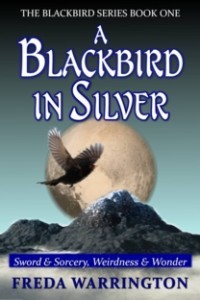 Of course, I know I’m preaching to the converted here. We are the enlightened ones – we know that fantasy settings can explore deep truths about psychology and human behaviour and life itself in the purest way possible. Some books educate, some books entertain, and some are cathartic, across all genres. The best do all of those things. When I wrote my first (published) novel, A Blackbird in Silver/A Blackbird in Darkness, yes, it was partly wish-fulfilment: a desire to excite myself with a strange, mystical, surreal adventure such as those created by Ray Bradbury, Tanith Lee, Michael Moorcock. But the story was also cathartic for me. The dreaded Serpent that threatened my fantasy world represented the very tangible Cold War terror of nuclear annihilation in the real world (a threat that’s recently reared its ugly head again). The Blackbird books are dark books. The characters have quite a hellish time, only winning through at great cost. I suppose they were fighting my inner demons for me. And writing their story provided a healthier outlet for my troubles than, for example, sniffing glue, vandalising bus shelters or committing petty crime!
Of course, I know I’m preaching to the converted here. We are the enlightened ones – we know that fantasy settings can explore deep truths about psychology and human behaviour and life itself in the purest way possible. Some books educate, some books entertain, and some are cathartic, across all genres. The best do all of those things. When I wrote my first (published) novel, A Blackbird in Silver/A Blackbird in Darkness, yes, it was partly wish-fulfilment: a desire to excite myself with a strange, mystical, surreal adventure such as those created by Ray Bradbury, Tanith Lee, Michael Moorcock. But the story was also cathartic for me. The dreaded Serpent that threatened my fantasy world represented the very tangible Cold War terror of nuclear annihilation in the real world (a threat that’s recently reared its ugly head again). The Blackbird books are dark books. The characters have quite a hellish time, only winning through at great cost. I suppose they were fighting my inner demons for me. And writing their story provided a healthier outlet for my troubles than, for example, sniffing glue, vandalising bus shelters or committing petty crime!
Olaf Stapledon’s essay, ‘Escapism in Literature,’ defined four types of literature: Creative, Propaganda, Release, and Escape. I won’t go into detailed analysis – you can find that elsewhere – but it’s notable that he was most disparaging about ‘Escape’. He declares that ‘the fantasy purports to be symbolically true of reality.’ This is characteristic of its ‘morbid blindness… [which] not only blots out the obnoxious aspect of reality but also reconstructs the remaining characters into a coherent and lying image… There is no self-probing… Of the four kinds of import which any writing may have, I judge “creation” (as defined) wholly good and “escape” wholly bad.’
Ouch!
No self-probing? Have you read my books?
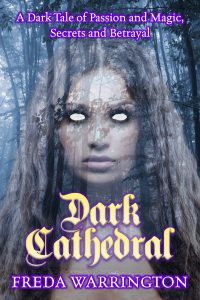 Yes, on one level, my A TASTE OF BLOOD WINE series (first published in the 1990s, to clarify that they owe nothing to more recent vampire crazes!) are full-blooded gothic vampire romances. But – like my supernatural duo DARK CATHEDRAL and PAGAN MOON – they address some serious matters concerning gender equality, mainstream religion and its role in suppressing women and persecuting ‘witches’ down the ages, and – particularly in the 1920s setting of A Taste of Blood Wine – social change that is mirrored by the main character Charlotte’s journey from a shy mouse existing in her father’s shadow to becoming her true self. Recently I was editing Pagan Moon ready for Kindle, and I was shocked to come across a rant by the protagonist, Eirian, in which she complains about the backlash against feminism, including right-wing religious evangelicals rising up to suppress women’s basic rights, and the West ignoring the plight of women in third world countries, and so on. Shocked – because I wrote this book twenty years ago. And we are up against exactly the same issues, twenty years on. So, the observation in a fantasy novel that the world seems to be running up a down escalator is hardly ‘escape from reality’. But I digress.
Yes, on one level, my A TASTE OF BLOOD WINE series (first published in the 1990s, to clarify that they owe nothing to more recent vampire crazes!) are full-blooded gothic vampire romances. But – like my supernatural duo DARK CATHEDRAL and PAGAN MOON – they address some serious matters concerning gender equality, mainstream religion and its role in suppressing women and persecuting ‘witches’ down the ages, and – particularly in the 1920s setting of A Taste of Blood Wine – social change that is mirrored by the main character Charlotte’s journey from a shy mouse existing in her father’s shadow to becoming her true self. Recently I was editing Pagan Moon ready for Kindle, and I was shocked to come across a rant by the protagonist, Eirian, in which she complains about the backlash against feminism, including right-wing religious evangelicals rising up to suppress women’s basic rights, and the West ignoring the plight of women in third world countries, and so on. Shocked – because I wrote this book twenty years ago. And we are up against exactly the same issues, twenty years on. So, the observation in a fantasy novel that the world seems to be running up a down escalator is hardly ‘escape from reality’. But I digress.
I much prefer the words of C.S. Lewis, ‘…My friend Professor Tolkien asked me the very simple question, “What class of Men would you expect to be the most preoccupied with, and most hostile to, the idea of escape?” and gave the obvious answer: jailers.’
Even if we are talking psychological prisons, remember that the causes of your stress or depression do not want to let you go – yet a good book breaks their power over you. To that I would add the words of Neil Gaiman: ‘And escapist fiction… opens a door, shows the sunlight outside, gives you a place to go where you are in control… (and books are real places, make no mistake about that); and… can also give you knowledge about the world and your predicament, give you weapons, give you armour; real things you can take back into your prison. Skills and knowledge and tools you can use to escape for real.’
Yes, yes, yes.
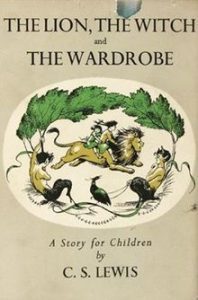 A memory: a friend and I were about eleven and heavily into the Narnia books – so much so that we were desperate for it to be real. Maybe C.S. Lewis knew something we didn’t! I remember we went round the back of the Lower Fourth buildings, a dubious area with overgrown shrubbery and a strange brick outhouse that was ankle-deep in cigarette ends – that was the sixth-formers’ doing, not ours. (There was also a waist-high wall that we’d jump off, occasionally sustaining broken bones, and a gate that was never locked, allowing anyone to stroll off the street into the school grounds as they pleased. None of this Health and Safety nonsense in our day!) Anyway – this friend and I made an Aslan out of plasticine, and placed a magic circle of pebbles around him, and we called on him and pleaded with him to open a door to Narnia for us.
A memory: a friend and I were about eleven and heavily into the Narnia books – so much so that we were desperate for it to be real. Maybe C.S. Lewis knew something we didn’t! I remember we went round the back of the Lower Fourth buildings, a dubious area with overgrown shrubbery and a strange brick outhouse that was ankle-deep in cigarette ends – that was the sixth-formers’ doing, not ours. (There was also a waist-high wall that we’d jump off, occasionally sustaining broken bones, and a gate that was never locked, allowing anyone to stroll off the street into the school grounds as they pleased. None of this Health and Safety nonsense in our day!) Anyway – this friend and I made an Aslan out of plasticine, and placed a magic circle of pebbles around him, and we called on him and pleaded with him to open a door to Narnia for us.
Nothing happened, of course. And we knew full well that nothing was going to happen. We knew it wasn’t real. But we still had to give it a try, just to be sure. I don’t know how many years passed before I gave up hope that the enchanted Otherworld was real – but dreaming is different. That Otherworld is real inside our imaginations. I still haven’t given up dreaming.
So I do hope you’ll give NIGHTS OF BLOOD WINE (Telos Books) a chance. Sarah asked me to say something about writing short stories: well, I’m mostly a novelist and not a prolific story writer. That said, I was delighted to find I’d accumulated enough to put out an actual collection. And I seem to have discovered a new pleasure in writing them, in creating snapshots of my characters’ lives for which there wasn’t room in a novel. The weirdest and most wonderful thing is that Nights of Blood Wine turns out to contain a hidden story, one I haven’t had time to tell fully yet. There are some teasing hints of it, in ‘The Ghost Who Looks Like You,’ and in ‘Las Muertas Invidas’. Just hints. What is that pale traveller up to? One day I’ll tell her story. Meanwhile, I do like it when my characters – especially ones from different series – cross over into each other’s worlds. Writing becomes fun again, and so does the pleasure of reading.
Nights of Blood Wine has ten stories set in my ‘Blood Wine’ world of vampires – including four brand new ones – and five others of gothic strangeness. You’ll find two young women calling on Santa Muerte, the Death Goddess, to help them escape from a brutal women’s prison; a distressed waitress escaping from a dystopian future into an idyllic Otherworld, only to flee from her rescuers as well; a mother shaking off the bonds of misogyny in a most unexpected way; a reborn Aetherial (Aetherials are my ‘other race’ from Elfland) seeking a way back into her past to unravel a mystery; a desperate artist in danger in the Russian Revolution. Perhaps my favourite is ‘Ruins and Bright Towers’, a story originally published in NIGHT’S NIECES (Immanion Press) in tribute to Tanith Lee. Two girls, trapped in poverty in a grim decaying city, bond over a Tanith Lee novel, The Storm Lord, and are inspired to attempt an escape from their hopeless situation. You could call it a truly literal interpretation of fantasy leading to escapism: a novel inspires a bid for freedom in the most real sense.
All is not lost.
Not all the stories are about escape, of course. Others are quite the opposite. Some characters deliberately step into a dangerous situation that they could have avoided. Or they bind their lives to a cause out of sheer love, chivalry. And I don’t hold out much hope for the folk in that snowbound castle…
After all, it’s sometimes a relief to know we can set down that horror novel and escape back into normal life!
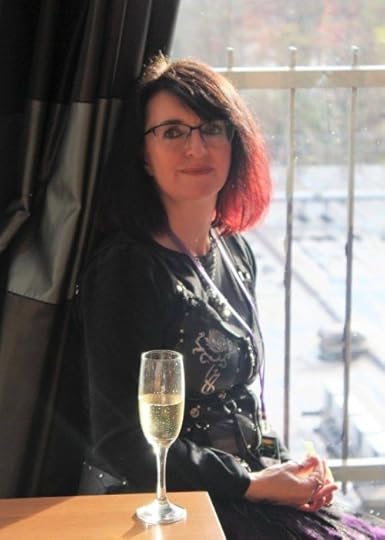
Freda Warrington is the author of 21 fantasy novels including A Taste of Blood Wine (gothic vampire fantasy from Titan), The Court of the Midnight King (an alternative history of King Richard III), Elfland (winner of Romantic Times BEST FANTASY NOVEL 2009), Dracula the Undead (Winner of the Dracula Society BEST GOTHIC NOVEL 1997), A Blackbird in Silver, and Dark Cathedral. Most novels are still available – you can buy A Blackbird in Silver and its sequels on Kindle, on Audible, or in paperback from Immanion Press. Her latest short story, Ruins and Bright Towers, appears in Night’s Nieces (Immanion Press 2016, ed. Storm Constantine) – an anthology dedicated in loving tribute to the late Tanith Lee by those authors she considered her “nieces.” Her latest book is Nights of Blood Wine (Telos Books 2017), a collection of lush dark tales, and her supernatural duo, Dark Cathedral and Pagan Moon, are now available on Kindle. She lives in rural Leicestershire with her husband Mike and her widowed mum, where currently she’s trying to work on her new novel more, and stare out of the window less.
Full information at www.fredawarrington.com
Facebook: https://www.facebook.com/freda.warrington
Please Feel Free to Share:







April 29, 2017
Freda Warrington on the Guest Blog on May 1st!

I’m delighted to welcome Freda Warrington back to the Guest Blog on May 1st with a post that will resonate with readers of fantasy, horror and science fiction: Escape and Escapism. Freda’s latest book, a collection of ‘dark, dark tales’, Nights of Blood Wine, has just been published by Telos Publishing.
Please Feel Free to Share:







April 24, 2017
Jessica Rydill writes about Travelling in Time

Missed Jessica Rydill’s engrossing post about Travelling in Time? No worries – you can still read about some of the influences and inspirations for Jessica’s latest novel Winterbloom (to be published by Kristell Ink) here!
(The photograph shows some of the metopes in John Wood’s King’s Circus, now know as The Circus and recently voted in Britain.)
And I’m thrilled to announce that the next writer returning to the Guest Blog is Freda Warrington! Call back on May 1st to discover Freda’s fascinating new post Escape and Escapism.
Please Feel Free to Share:







April 17, 2017
Travelling in Time – Jessica Rydill
Travelling in Time

When Sarah asked me to write an article for this series, I wasn’t sure where to begin. As mentioned elsewhere, the small press Kristell Ink, also known as Grimbold Books, are planning to reissue my back catalogue and also to publish my most recent novel, Winterbloom.
I’ve blogged a lot about the world and context of the books, but I thought I’d devote this piece to the background to Winterbloom, which is something of a departure from the previous novels in the series.
Winterbloom features several of the familiar characters from the other novels, together with a many new characters. This is partly because it is set, not in one world, but in three. And one of those worlds is this one, Earth.
In short, it’s a parallel universe story. It features themes that have only been hinted at before. In particular there is a lot of stuff about roses. And the Greenwood, an idea that developed from my love of the comic series Swamp Thing, and which appears in William Morris’s Wood between the Worlds and C.S. Lewis…and many more.
The Goddess who appears in some of the earlier books is a forest goddess, and in Winterbloom the power of the Greenwood goes into battle against some angelic beings who are, as you might say, Up to No Good.
From my point of view as a writer, the funny part is that rather than being set in an alternate France, or Eastern Europe, much of Winterbloom takes place in England, in 1920s Bath. In particular the story features No. 13, The Circus and Stonehenge.
This meant I was researching my home town. I was born in Bath and have lived here on and off for most of my life. But this time, my characters get to visit the place. I was able to wander around The Circus and walk through Victoria Park visiting some of the locations in the book. I found that, because they are real places, it was much harder to describe them. Luckily for me, No. 13 The Circus is occupied by a dental practice, and I was able to have a look around. I was also lucky enough to join one of the out-of-hours visits to Stonehenge where you can get close to the Stones.
When I was growing up in Bath in the early 60s, it looked run-down. Many of the houses were badly blackened by soot from coal fires and pollution. It had a very different atmosphere, what you might call shabby genteel. It is hard to imagine now but if you look at old photos, you will see how dingy the streets used to look.
I set Winterbloom in the inter-war years for a reason. I wanted the reader, like the characters, to travel in time to a city that no longer exists. In World War II, parts of Bath were damaged in the Baedeker raids. In the 1960s and 70s, parts of the city were demolished, leading to campaigns to conserve and restore the city before most of the beautiful buildings were lost.
Winterbloom is, amongst other things, a story about loss, separation and memory. I wanted to recreate something of the place where I grew up, together with a snapshot of an older version of the city, before it became famous as a tourist destination.
And also, rather importantly, to evoke the fact that the Circus is said to be based on the measurements of Stonehenge, taken by its original architect, John Wood the Elder!
I also wanted to use more English folklore. Children of the Shaman and my other stories have drawn heavily on Jewish and Slavic legend. Winterbloom picks up an idea that first appears in Malarat, where one of the characters has an obsession with red roses. (Not a healthy obsession).
The red rose is a symbol packed with meaning, rather like the pomegranate. In fact, the original title of the book was going to be Pomegranate Seed, because it is, on one level, an elliptical retelling of the myth of Persephone. These images recur throughout the story, where the main character is a plain schoolgirl who is abducted by chthonic forces. Except that she’s more than just a schoolgirl, as she discovers to her dismay…
The red rose is an old symbol for England, but it also has an alchemical significance, and in Christianity it stands for martyrdom. I’m talking about a specific rose, not the ones you buy from florists or the supermarket: it’s the Rosa Gallica, also known as the Provins rose. A very old, species rose which at its most simple looks like what you see in heraldry; not a Tudor rose because that has a white centre and a red exterior.
Before anyone thinks the story has a heavily signalled allegorical intent, like C.S. Lewis again, I should add that it doesn’t. If anything, the rose and the Greenwood are pagan; we’re in Wicker Man country here, where people get sacrificed in order to secure a good harvest, and corn dollies have sinister undertones. And maypoles are definitely phallic symbols!
Rose, rose, always a rose;
In the beginning it began to grow.
Grew before time, between the stones;
Give me a penny for my pretty rose.
The rose is red, the rose is white,
Some bloom still in the darkest night;
The white rose flowers without any thorn,
The red rose bleeds, the dance goes on.
Author bio:
Jessica Rydill writes fantasy and collects Asian Ball Jointed Dolls, or BJD. At an average height of twenty inches tall, they can unnerve visitors. Many of the dolls are based on characters from her books.
Jessica’s novels are a cross-genre mash-up; they embrace fantasy with mediaeval warlords, and Victorian adventure with lightning-wielding shamans. A host of underworlds and other dimensions are only a short step away.
Jessica’s first three books are due to be reissued by Kristell Ink/Grimbold Books, together with Winterbloom.
Visit Jessica’s web-site at www.shamansland.com to learn more about Mir, the shamanworld.
Links:
web-site http://shamansland.com/
Facebook page https://www.facebook.com/jessicarydill/
Twitter https://twitter.com/razumova
blog http://shamansland.com/blog/
Kristell Ink Publisher web-site http://kristell-ink.com/
Please Feel Free to Share:







April 16, 2017
Jessica Rydill on the Guest Blog
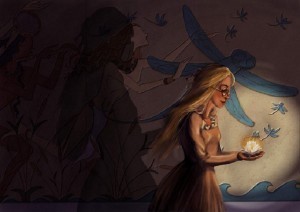
The next guest author – paying a welcome return visit – is Jessica Rydill. Do drop by the Guest Blog from 17th April onward to read her intriguing post entitled Travelling in Time and learn more about her latest – though not yet released – novel, Winterbloom.
Please Feel Free to Share:







April 10, 2017
Thank you to Sarah Higbee
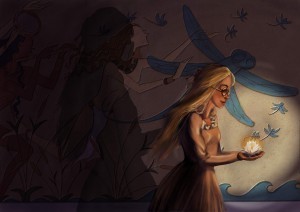
I was thrilled to start the 2017 Guest Blog with Sarah Higbee’s fascinating and entertaining post: How Do You Like Your Speculative Fiction? It’s well worth your attention, especially if you’re a writer or reader interested in genre and the difficulty of choosing and using genre labels/tags.
Sarah’s new novel Netted ‘a tale of family love, rivalry and cybernetic implants, with some kick-ass older women and a dark undertone of repression and obsession’ will be published by Kristell Ink in 2019.
Coming up next on the blog with be Jessica Rydill on 17.4.17 (not quite a palindrome!)
Please Feel Free to Share:










